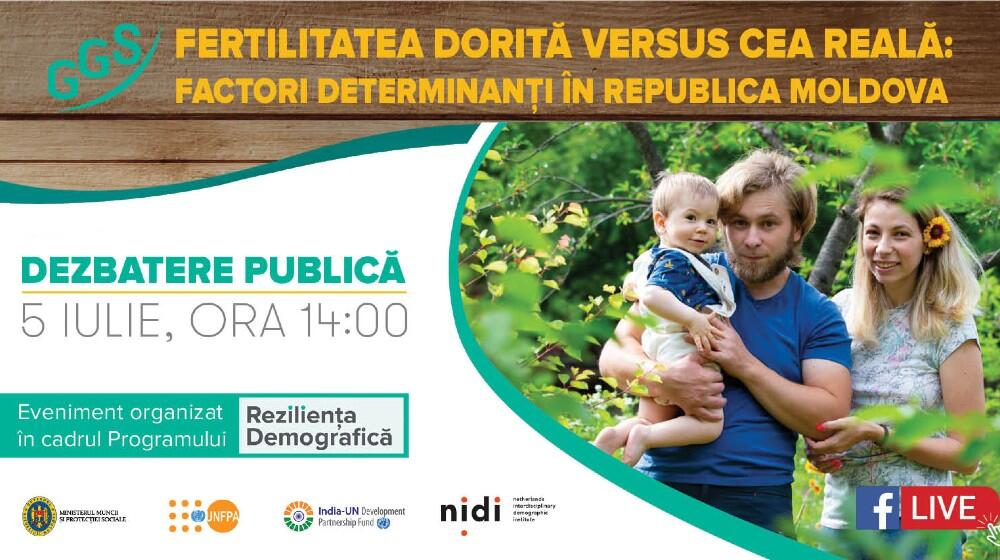One in six persons of reproductive age in the Republic of Moldova plans to have a child in the next 3 years, and one in two persons – wants to have a child at some stage of their life. Nonetheless, the decision to have a child is influenced by the socio-economic environment they live in. Job stability, access to flexible work schedules and fair distribution of household tasks between partners are the main factors to be taken into account by the authorities when developing demographic policies.
Women and men in the Republic of Moldova postpone the birth of their first child until the age of 30-40 years. This happens because women and men choose to study for a longer period of time, to make a career and secure themselves financially before having a child.
Studies show that the main barriers for couples in planning children are: low income, lack of flexible work schedules, insufficient childcare, focus on career growth to the detriment of forming a family and having a child. One of the analyses conducted shows that modern contraception methods are still used to a lesser extent than in European countries, and the Covid-19 pandemic has affected the access to family planning services and contraceptive use.
In the context of demographic changes in the Republic of Moldova, Tomas Sobotka, a demographics expert at the Institute of Demography in Vienna, emphasised that policies based on financial incentives are not effective, and in order to increase fertility intentions, the authorities need to create various flexible policy options that respond to the needs and preferences of Moldovan couples. According to the expert, sharing parental leave as a couple and ensuring gender equality by involving men in childcare are impact measures that can influence a couple in their desire to have children. The analyses carried out confirm these findings.
These are some of the findings of in-depth studies launched during the online event ‘Desired Fertility Versus Actual Fertility: Determinants in the Republic of Moldova’. The event was held recently as part of the Demographic Resilience Programme implemented by the UN Population Fund and the Ministry of Labour and Social Protection.
Currently, 4 international and 5 national researchers from academia and civil society are exploring GGS data to develop in-depth analyses on various demographic issues. Three of these analyses were presented by researchers from the Republic of Moldova, Spain and the Netherlands. The authors used data from the Generations and Gender Survey, which provide evidence on changes in reproductive behaviour across generations and people’s intentions to have children in the next 3 years. The analyses identify policy measures to support women and men in the Republic of Moldova to give birth to the desired number of children, thus contributing to the country’s development and to strengthening the demographic resilience.
‘The discussions we have today are an excellent opportunity to ensure the demographic resilience by building on the results of the GGS and the analysis of this study. I am confident that these findings can be useful to policy makers in developing demographic policies that are oriented towards people’s needs and that support Moldovan couples to have the desired number of children,’ said Nigina Abaszada, Resident Representative of UNFPA.
‘The results of the presented research are important for public authorities to better understand the demographic context in the Republic of Moldova and to set policy priorities for managing the demographic changes, including taking measures for families to achieve their reproductive intentions,’ said Aliona Cretu, Head of Department, Ministry of Labour and Social Protection.
The results of these analyses will be further used by UNFPA and the Government of the Republic of Moldova to develop demographic, social and economic policies adapted to people’s needs, in order to promote the demographic resilience of the Republic of Moldova. During 2022, a series of public debates will be held on the topics of desired fertility and reproductive changes, migration intentions of people planning to become parents, feeling of loneliness in Moldova, intergenerational support and other.
GGS in the Republic of Moldova is implemented by the UN Population Fund in partnership and with the financial support of the Ministry of Labour and Social Protection (MLSP) and India-UN Development Partnership Fund. The project partners include the Netherlands Interdisciplinary Demographic Institute (NIDI) and the National Bureau of Statistics (NBS), which developed the study sample.


